Charles E W Bean, Diaries, AWM38 3DRL 606/246/1 - 1916 - 1929 - Part 12
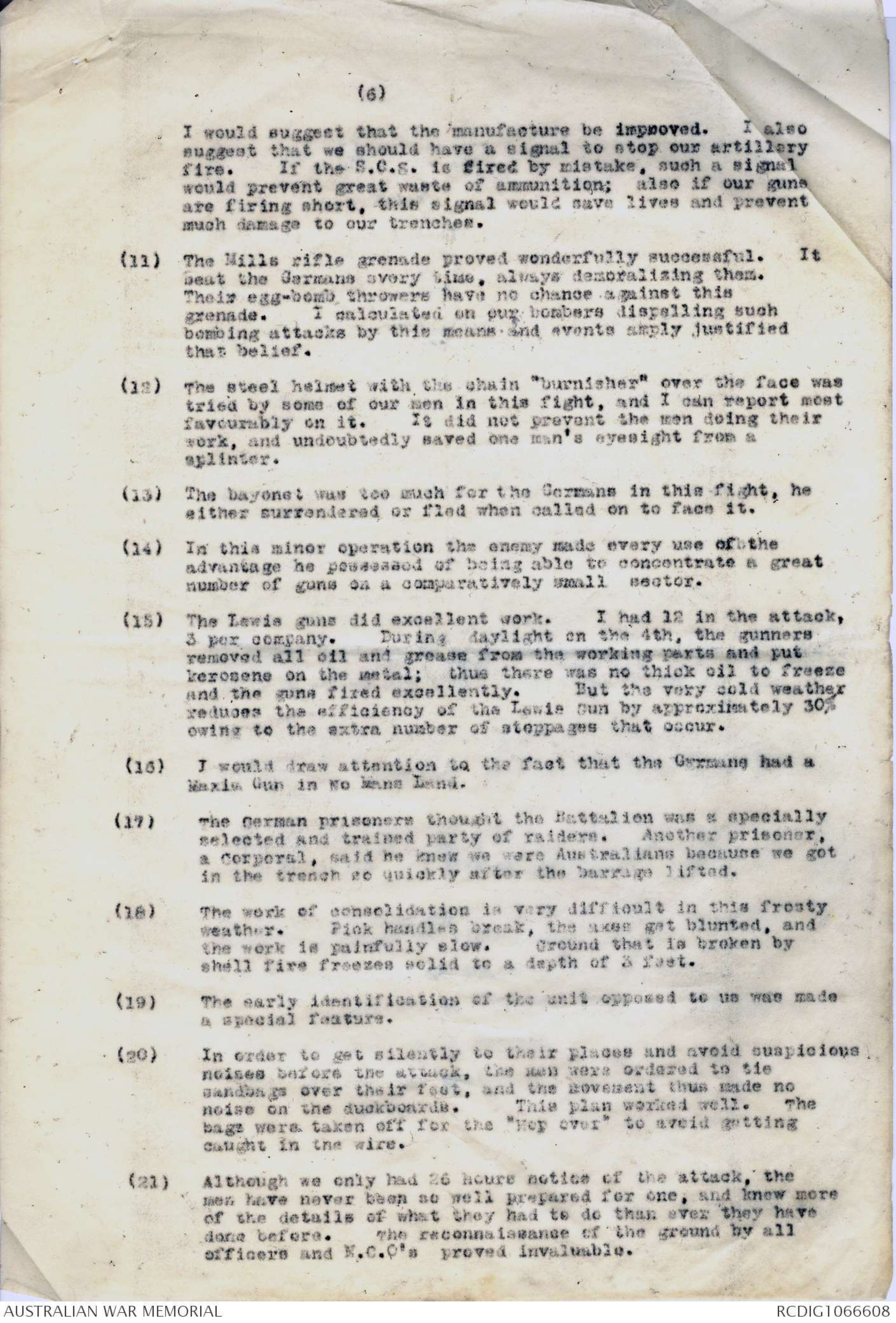
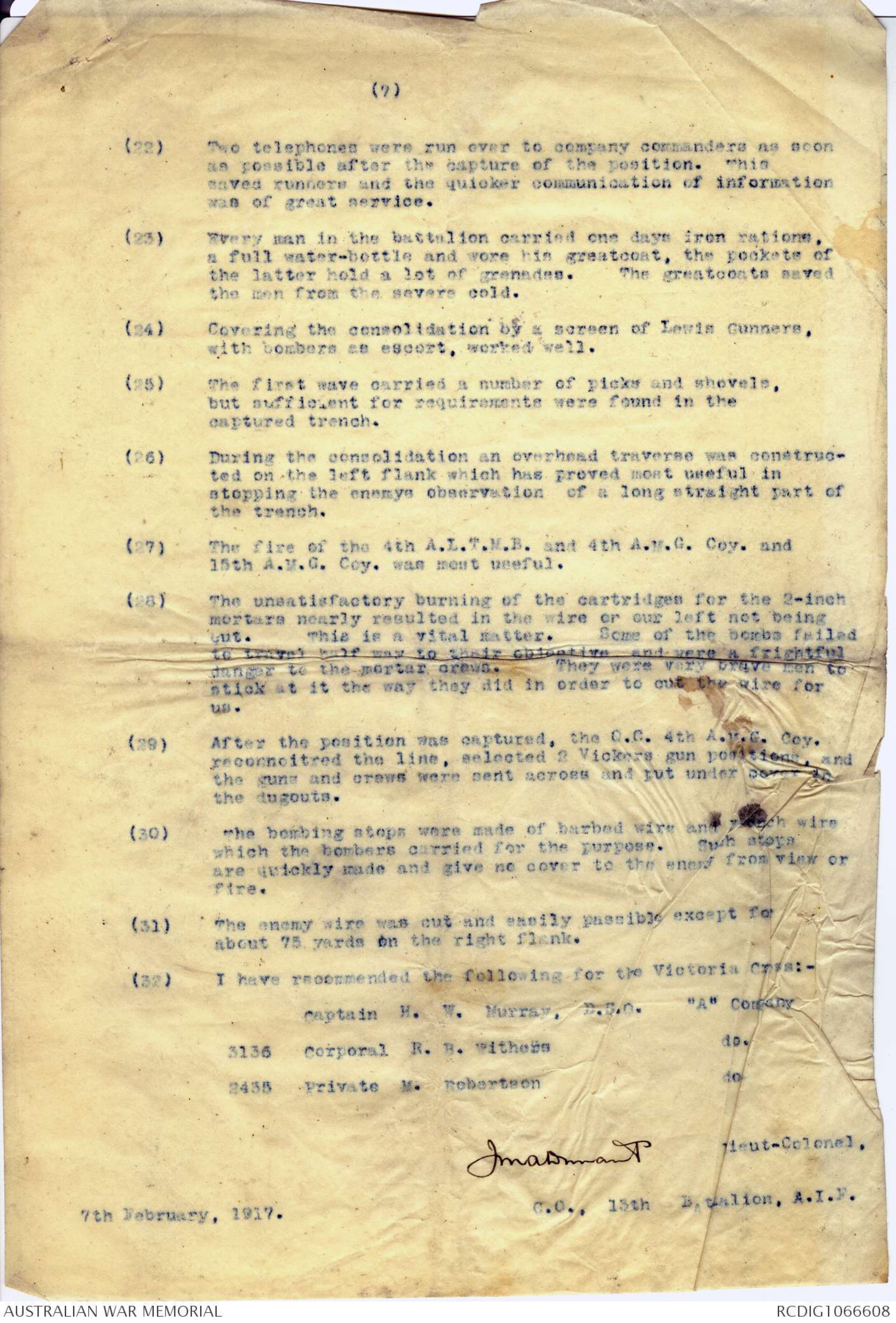
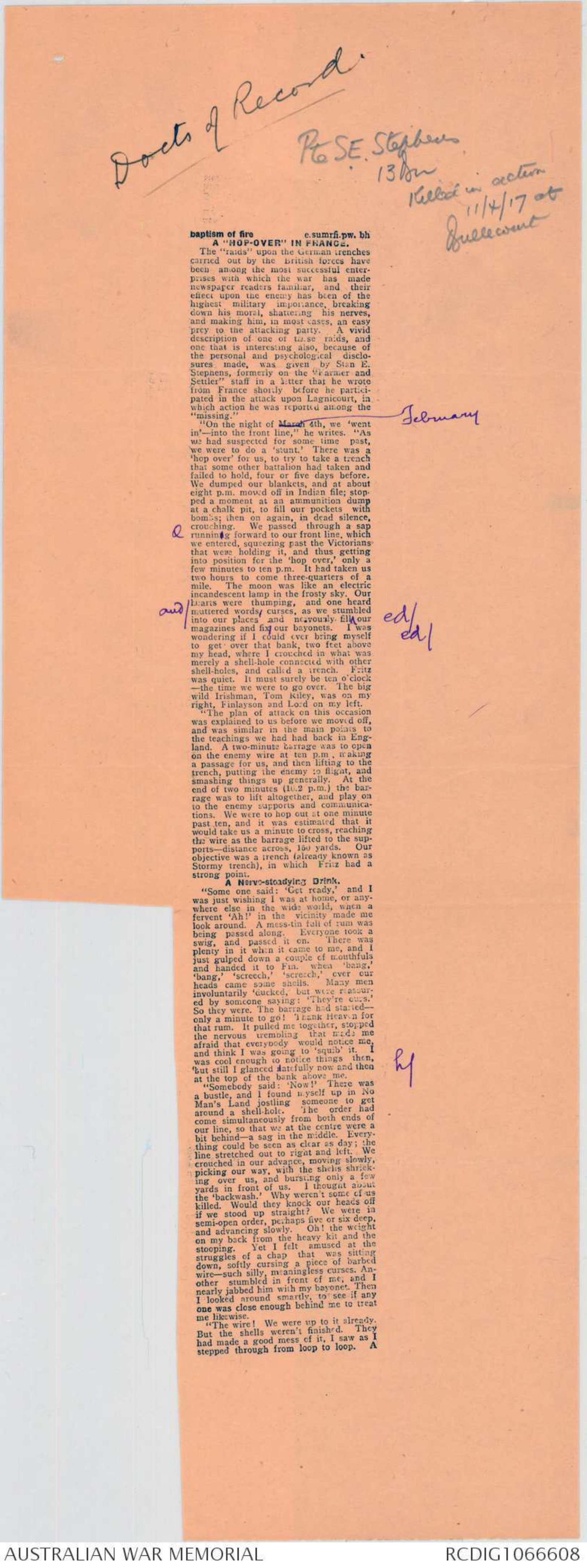
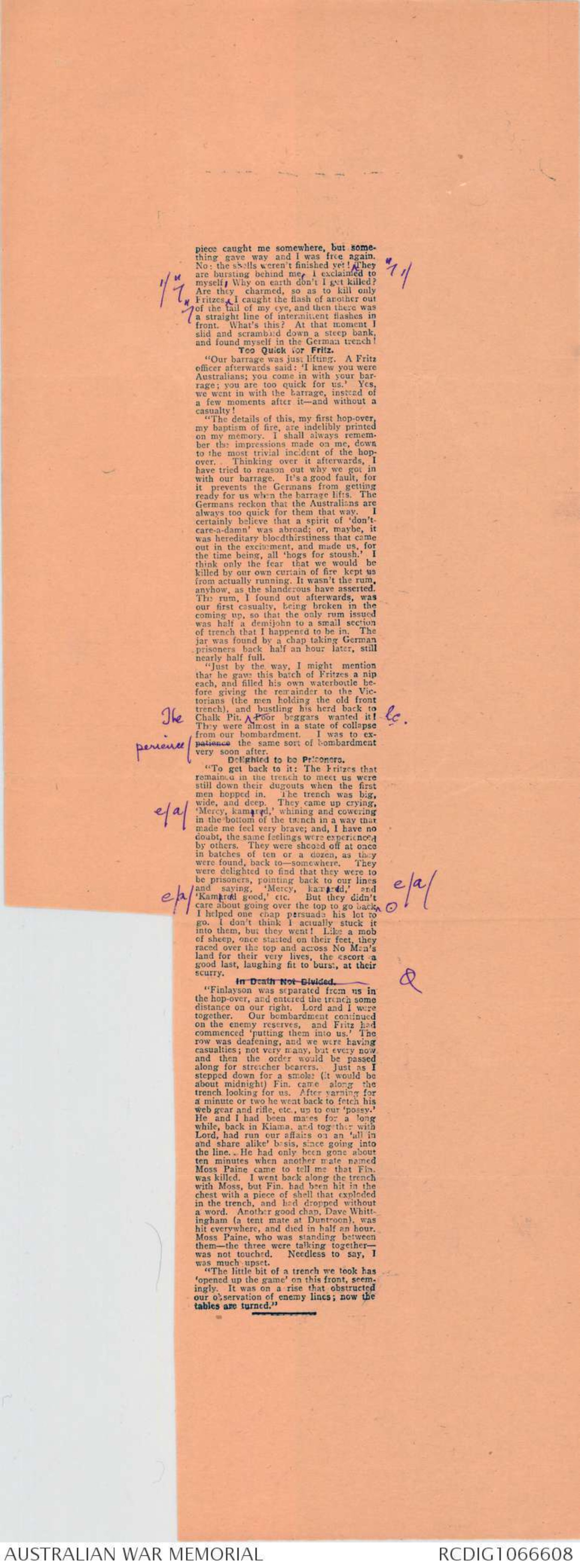
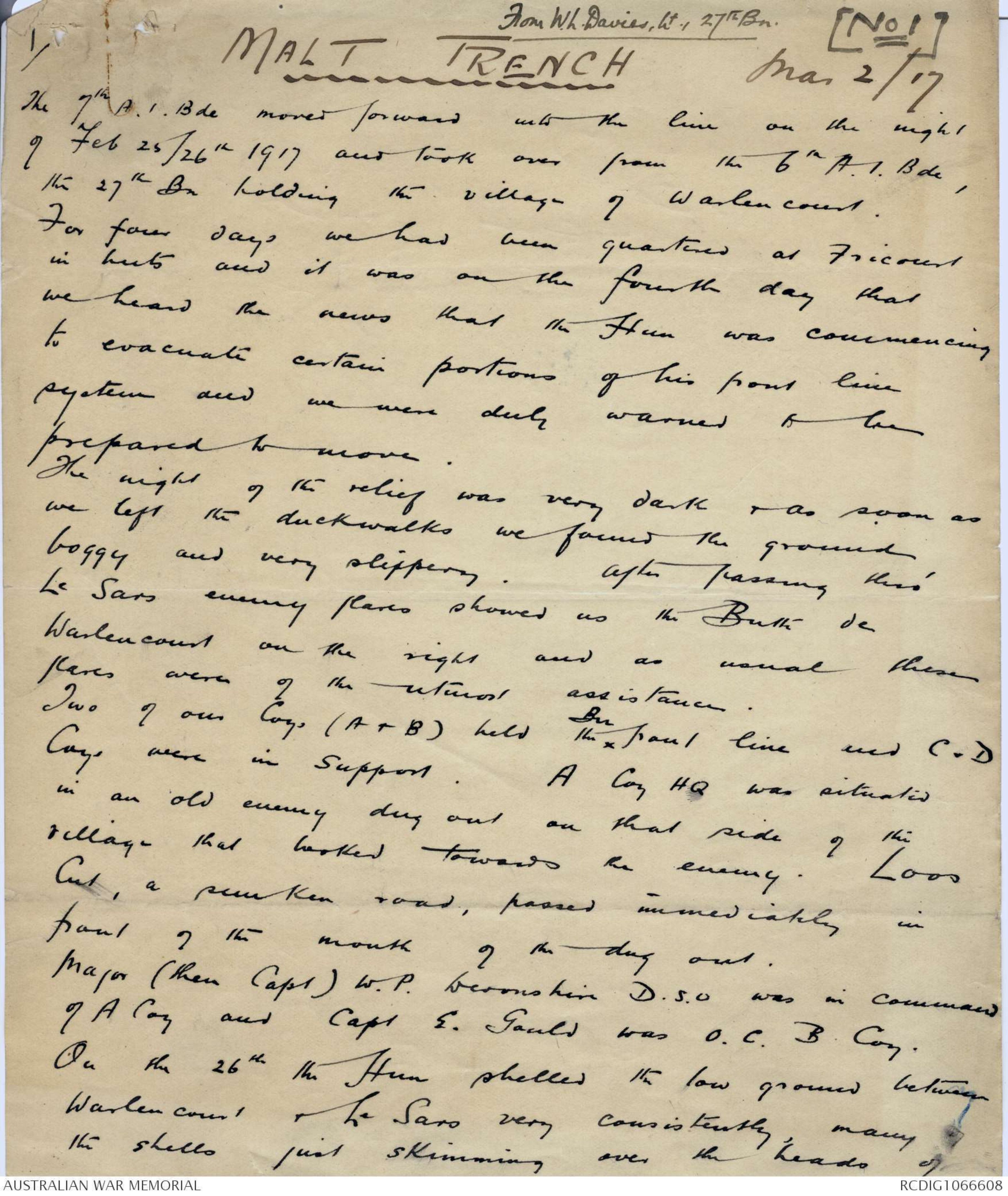
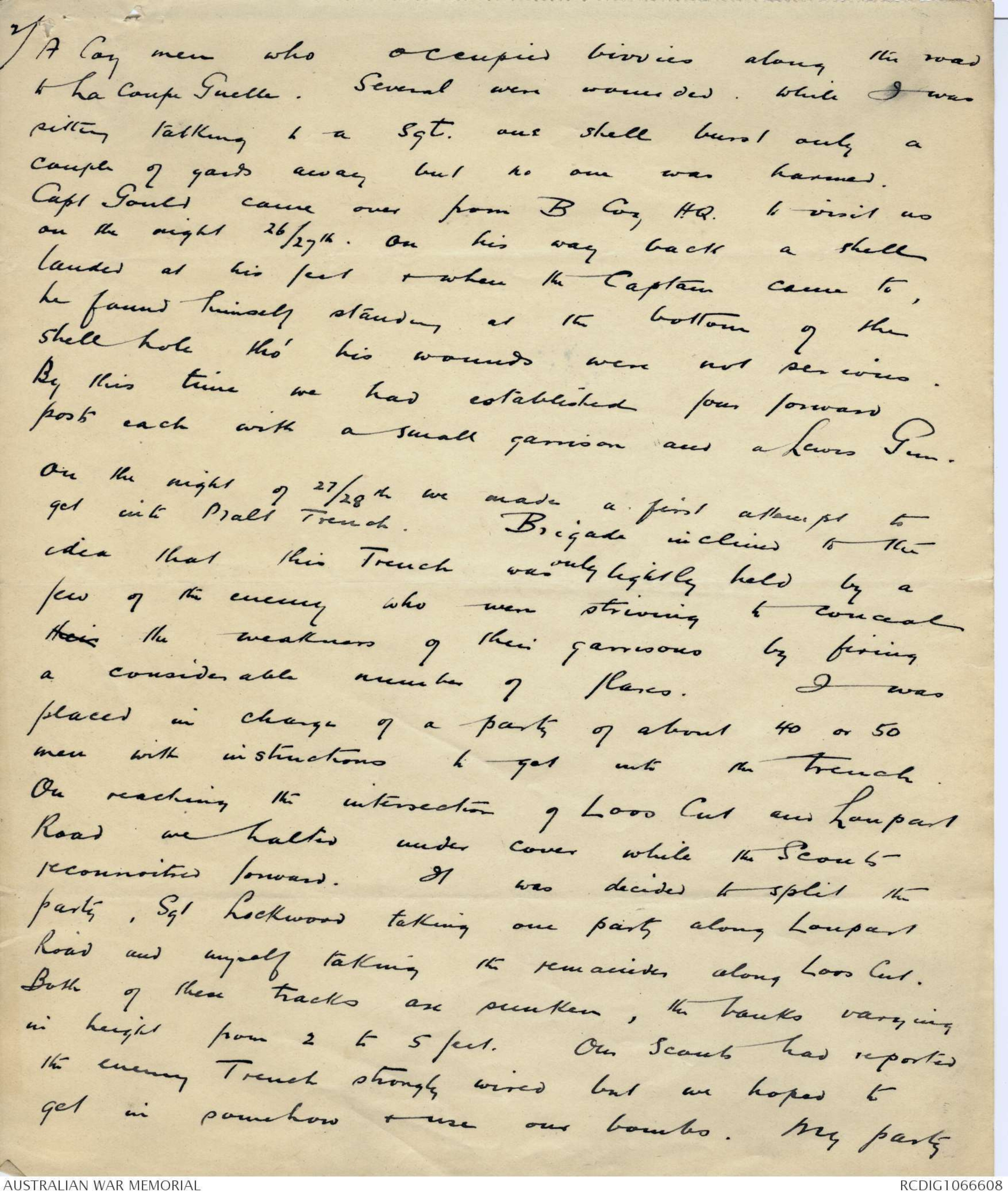
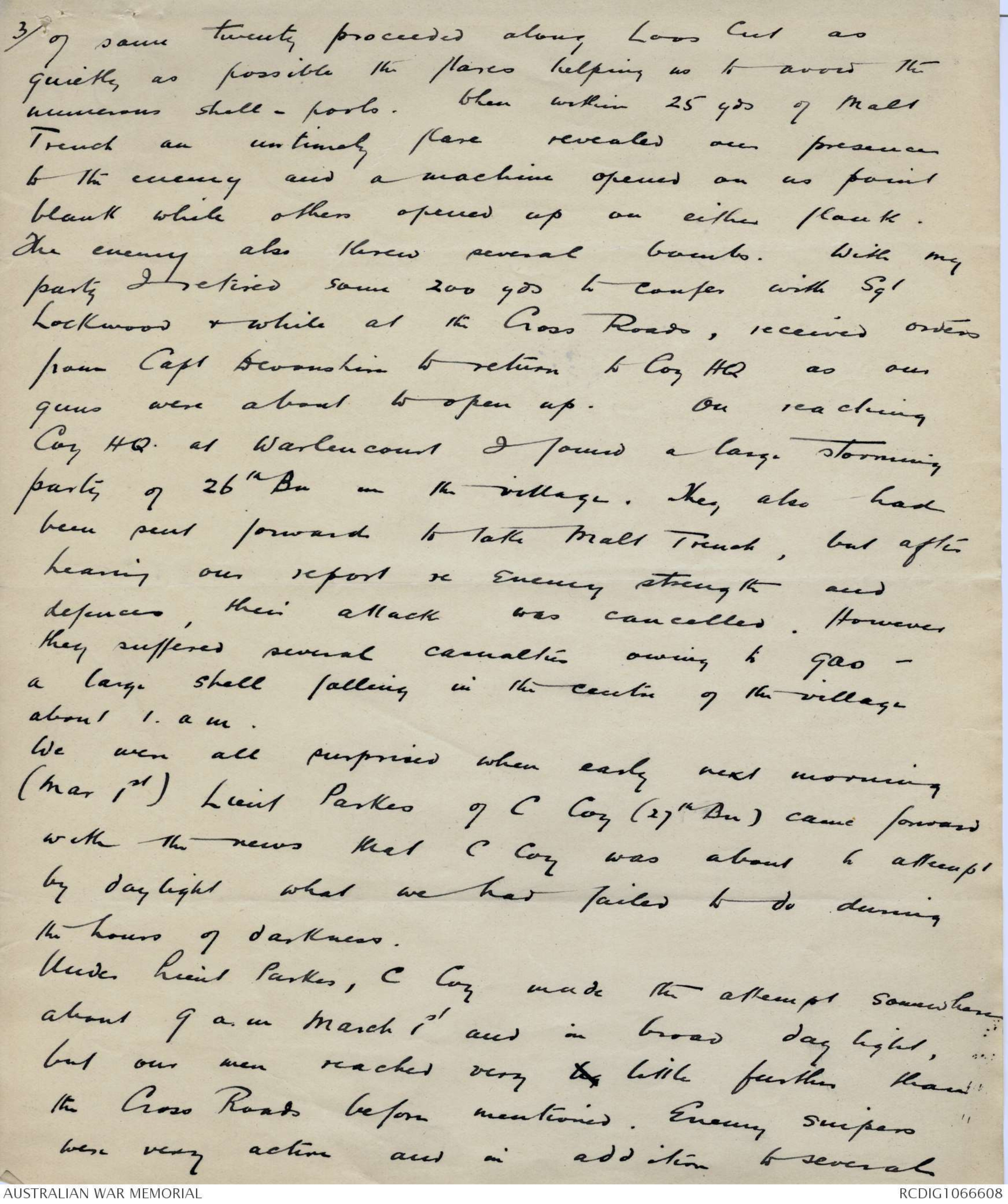
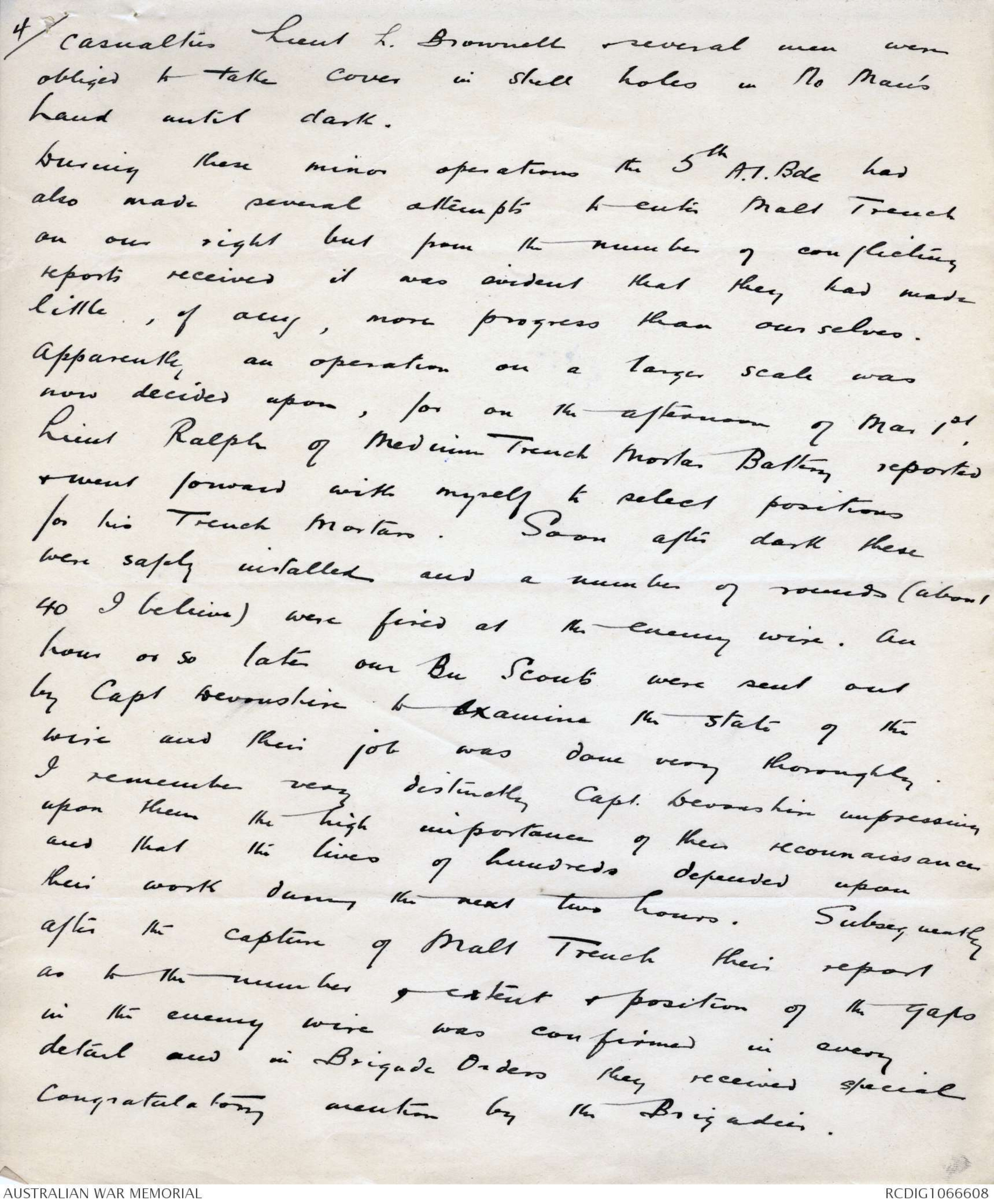
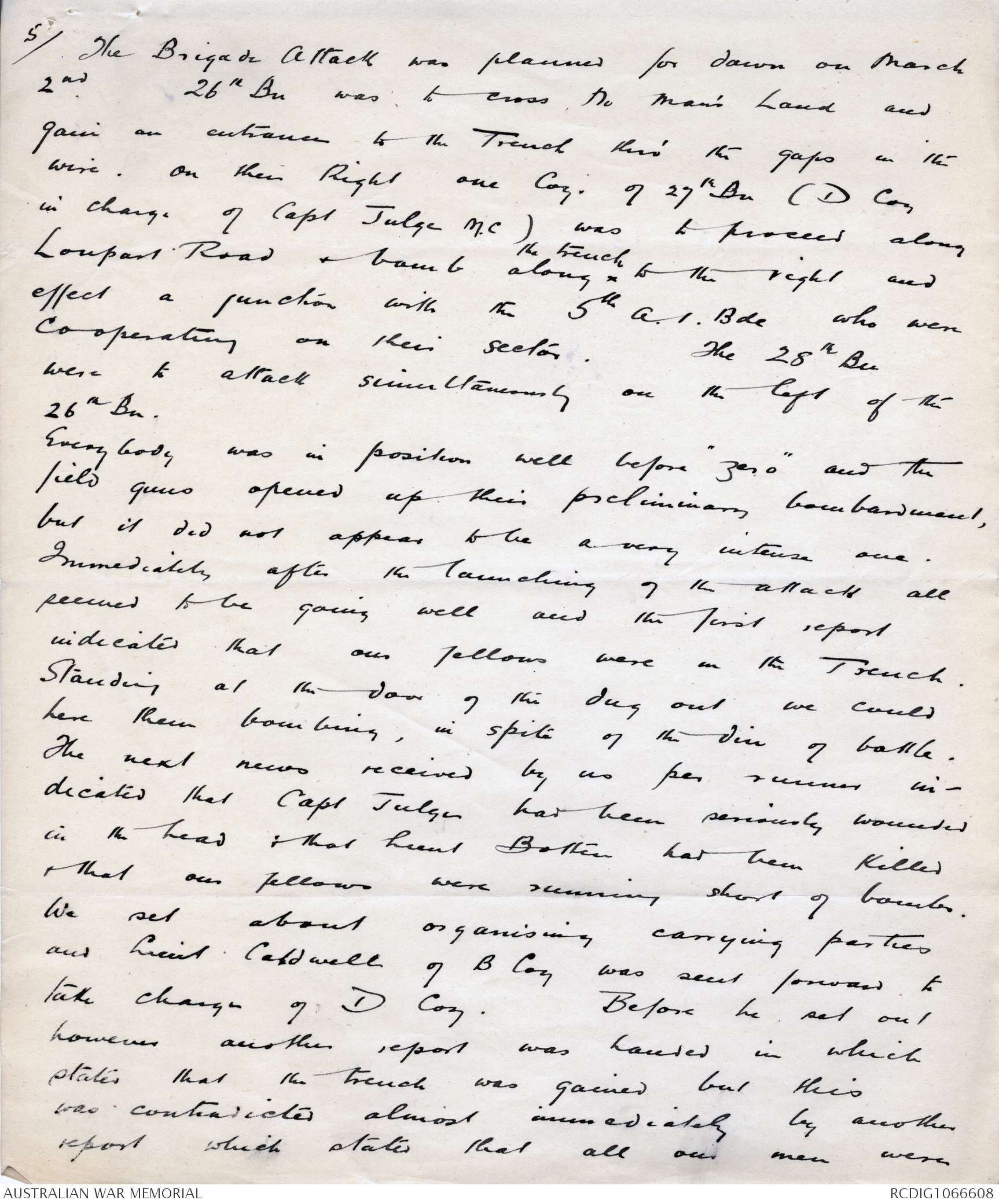
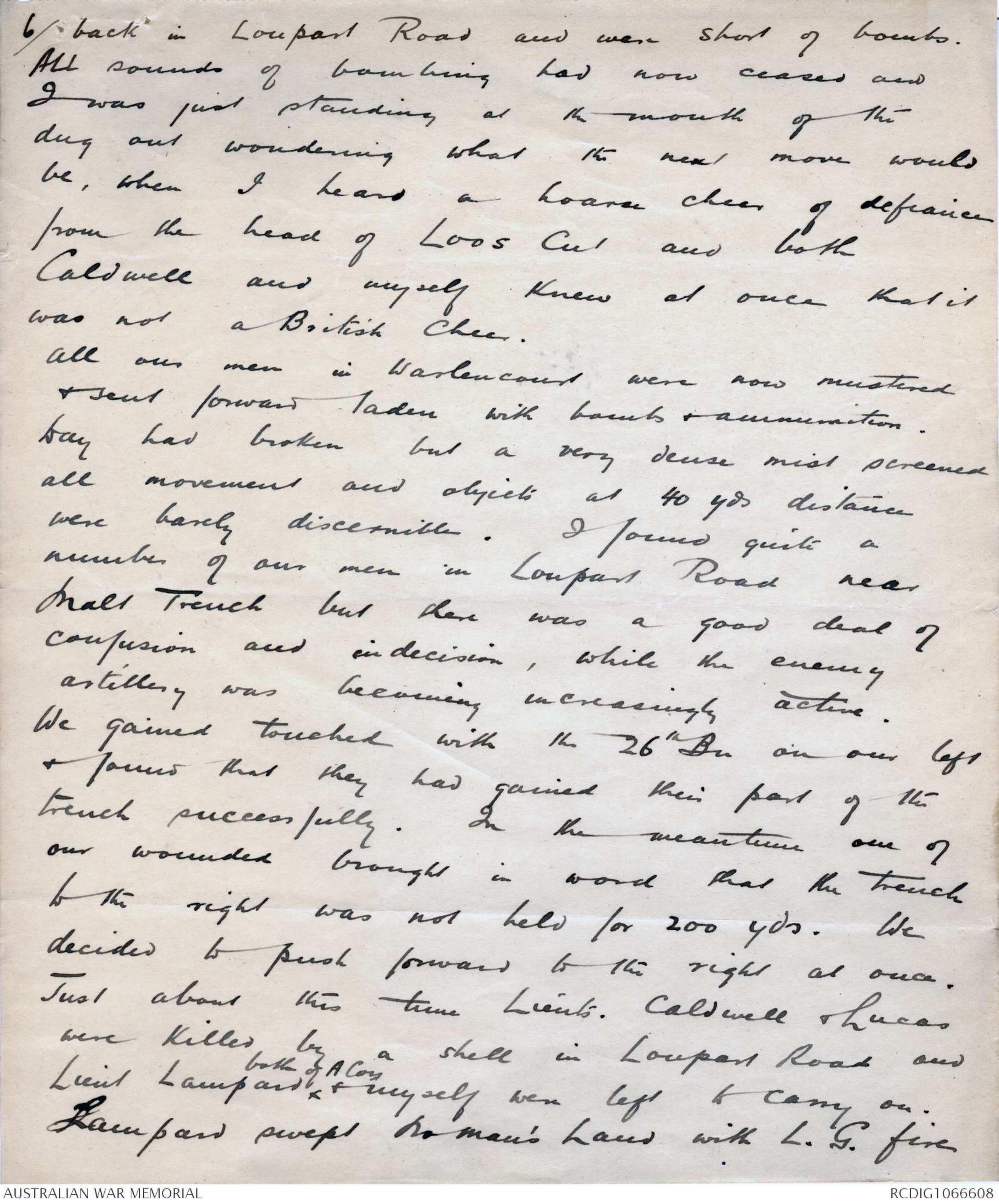
(6)
I would suggest that the manufacture be improved. I also
suggest that we should have a signal to stop our artillery
fire. If the S.C.S. is fired by mistake, such a signal
would prevent great waste of ammunition; also if our guns
are firing short, this signal would save lives and prevent
much damage to our trenches.
(11) The Mills rifle grenade proved wonderfully successful. 1t
beat the Germans every time, always demoralising them.
Their egg-bomb throwers have no chance against this
grenade. I calculated on our bombers dispelling such
bombing attacks by this means and events simply justified
that belief.
(12) The steel helmet with the chain "burnisher" over the face was
tried by some of our men in this fight, and I can report most
favourably on it. It did not prevent the men doing their
work, and undoubtedly saved one man's eyesight from a
splinter.
(13) The bayonet was too much for the Germans in this fight, he
either surrendered or fled when called on to face it.
(14) In this minor operation the enemy made every use of the
advantage he possessed of being able to concentrate a great
number of guns on a comparatively small sector.
(15) The Lewis guns did excellent work. I had 12 in the attack,
3 per company. During daylight on the 4th, the gunners
removed all oil and grease from the working parts and put
Kerosene on the metal; thus there was no thick oil to freeze
and the guns fired excellently. But the very cold weather
reduces the efficiency of the Lewis gun by approximately 30%
owing to the extra number of stoppages that occur.
(16) I would draw attention to the fact that the Germans had a
Waxis Gun in No Mans Land.
(17) The German prisoners thought the Battalion was & specially
selected and trained party of raiders. Another prisoner,
a Corporal, said he knew we were Australians because we got
in the trench so quickly after the barrage lifted.
(18) The work of consolidation is very difficult in this frosty
weather. Pick handles break, the axes get blunted, and
the work is painfully slow. Ground that is broken by
shell fire freezes solid to a depth of 3 feet.
(19) The early identification of the unit opposed to us was made
a special feature.
(20) In order to get silently to their places and avoid suspicious
noises before the attack, the men were ordered to tie
sandbags over their feet, and the movement thus made no
noise on the duckboards. This plan worked well. The
bags were taken off for the "Hop over" to avoid getting
caught in the wire.
(21) Although we only had 26 hours notice of the attack, the
men have never been so well prepared for one, and knew more
of the details or what they had to do than ever they have
done before. The reconnaissance of the ground by all
officers and N.C.O's proved invaluable.
(7)
(22) The telephones were run over to company commanders as soon
as possible after the capture of the position. This
saved runners and the quicker communication of information
was of great service.
(23) Every man in the battalion carried one days iron rations,
a full water-bottle and wore his greatcoat, the pockets of
the latter hold a lot of grenades. The greatcoats saved
the men from the severe cold.
(24) Covering the consolidation by a screen of Lewis Gunners,
with bombers as escort, worked well.
(25) The first wave carried a number of picks and shovels,
but sufficient for requirements were found in the
captured trench.
(26) During the consolidation an overhead traverse was constructed
on the left flank which has proved most useful in
stopping the enemys observation of a long straight part of
the trench.
(27) The fire of the 4th A.L.T.M.B. and 4th A.M.G. Coy. and
15th A.M.G. Coy. was most useful.
(28) The unsatisfactory burning of the cartridges for the 2-inch
mortars nearly resulted in the wire on our left not being
cut. This is a vital matter. Some of the bombs failed
to travel half way to their objective and were a frightful
danger to the mortar crews. They were very brave men to
stick at it the way they did in order to cut the wire for
us.
(29) After the position was captured, the O.C. 4th A.M.G. Coy.
reconnoitred the line, selected 2 Vickers gun positions, and,
the guns and crews were sent across and put under cover of
the dugouts.
(30) The bombing stops were made of barbed wire and trench wire
which the bombers carried for the purpose. Such stops
are quickly made and give no cover to the enemy from view or
fire.
(31) The enemy wire was cut and easily passable except for
about 75 yards on the right flank.
(32) I have recommended the following for the Victoria Cross:-
Captain H.W. Murray D.S.O. "A" Company
3136 Corporal R. B. Withers do.
2435 Private M. Robertson do.
J M A Durrant Lieut-Colonel
C.O., 13th Battalion, A.I.F.
7th February, 1917.
Docts of Record.
Pte S.E. Stephens
13 Bn
Killed in action
11/4/17 at
Bullecourt
Baptism of fire c.sumrfi.pw.bh
A "HOP-OVER" IN FRANCE.
The "raids" upon the German trenches
carried out by the British forces have
been among the most successful enterprises
with which the war has made
newspaper readers familiar, and their
effect upon the enemy has been of the
highest military importance, breaking
down his moral, shattering his nerves,
and making him, in most cases, an easy
prey to the attacking party. A vivid
description of one of those raids, and
one that is interesting also, because of
the personal and psychological
disclosures made, was given by Stan E.
Stephens, formerly on the "Farmer and
Settler" staff in a letter that he wrote
from France shortly before he
participated in the attack upon Lagnicourt, in
which action he was reported among the
"missing".
[[*February*]] On the night of March 4th, we 'went
in'-into the front line," he writes. "As
we had suspected for some time past,
'we were to do a 'stunt' There was a
'hop over' for us, to try to take a trench
that some other battalion had taken and
failed to hold, four or five days before.
We dumped our blankets, and at about
eight p.m. moved off in Indian file; stopped
a moment at an ammunition dump
at a chalk pit, to fill our pockets with
bombs; then on again, in dead silence,
crouching. We passed through a sap
running forward to our front line, which
we entered, squeezing past the Victorians
that were holding it, and thus getting
into position for the 'hop over,' only a
few minutes to ten p.m. It had taken us
two hours to come three quarters of a
mile. The moon was like an electric
incandescent lamp in the frosty sky. Our
hearts were thumping, and one heard
muttered words ^and curses, as we stumbled
into our places and nervously filled our
magazines and fixed our bayonets. I was
wondering if 1 could ever bring myself
to get over that bank, two feet above
my head, where I crouched in what was
merely a shell-hole connected with other
shell-holes, and called a trench. Fritz
was quiet. It must surely be ten o'clock
—the time we were to go over. The big
wild Irishman, Tom Riley, was on my
right, Finlayson and Lord on my left.
The plan of attack on this occasion
was explained to us before we moved off,
and was similar in the main points to
the teachings we had had back in England.
A two minute barrage was to open
on the enemy wire at ten p.m, making
a passage for us, and then lifting to the
trench, putting the enemy to flight, and
smashing things up generally. At the
end of two minutes (10.2 p.m.) the
barrage was to lift altogether, and play on
to the enemy supports and communications.
We were to hop out at one minute
past ten, and it was estimated that it
would take us a minute to cross, reaching
the wire as the barrage lifted to the
supports—distance across, 150 yards. Our
objective was a trench already known as
Stormy trench), in which Fritz had a
strong point.
A Nerve-steadying Drink.
"Some one said: 'Get ready,' and I
was just wishing I was at home, or
anywhere else in the wide world, when a
fervent 'Ah!' in the vicinity made me
look around. A mess-tin full of rum was
being passed along. Everyone took a
swig and passed it on. There was
plenty in it when it came to me, and I
just gulped down a couple of mouthfuls
and handed it to Fin. when 'bang.'
'bang.', 'screech,' 'screech,' over our
heads came some shells. Many men
involuntarily 'ducked,' but were reassured
by someone saying: 'They're ours.'
So they were. The barrage had started—
only a minute to go! 'Thank Heaven for
that rum. It pulled me together, stopped
the nervous trembling that made me
afraid that everybody would notice me.
and think I was going to 'squib' it. I
was cool enough to notice things then,
but still I glanced dutifully now and then
at the top of the bank above me.
"Somebody said: 'Now!' There was
a bustle, and 1 found myself up in No
Man's Land jostling someone to got
around a shell-hole. The order had
come simultaneously from both ends of
our line, so that we at the centre were a
bit behind—a sag in the middle. Everything
could be seen as clear as day; the
line stretched out to right and left., We
crouched in our advance, moving slowly
picking our way, with the shells shrieking
over us, and bursting only a few
yards in front of us. I thought about
the 'backwash.' Why weren't some of us
killed. Would they knock our heads off
if we stood up straight? We were in
semi-open order, perhaps five or six deep,
and advancing slowly. Oh! the weight
on my back from the heavy kit and the
stooping. Yet I felt amused at the
struggles of a chap that was sitting
down, softly cursing a piece of barbed
wire—such silly, meaningless curses.
Another stumbled in front of me, and I
nearly jabbed him with my bayonet Then
I looked around smartly, to see if any
one was close enough behind me to treat
me likewise.
"The wire! We were up to it already.
But the shells weren't finished. They
had made a good mess of it, I saw as I
stepped through from loop to loop. A
piece caught me somewhere, but
something gave way and I was free again.
No: the shells weren't finished yet! They
are bursting behind me, I exclaimed to
myself. Why on earth don't I get killed?
Are they charmed, so as to kill only
Fritzes, I caught the flash of another out
of the tail of my eye, and then there was
a straight line of intermittent flashes in
front. What's this? At that moment I
slid and scrambled down a steep bank,
and found myself in the German trench!
Too Quick for Fritz.
"Our barrage was just lifting. A Fritz
officer afterwards said: 'I knew you were
Australians; you come in with your
barrage; you are too quick for us.' Yes.
we went in with the barrage, instead of
a few moments after it—and without a
casualty.
"The details of this, my first hop-over,
my baptism of fire, are indelibly printed
on my memory. I shall always remember
the impressions made on me, down
to the most trivial incident of the
hop-over.. . . Thinking over it afterwards, I
have tried to reason out why we got in
with our barrage. It's a good fault, for
it prevents the Germans from getting
ready for us when the barrage lifts. The
Germans reckon that the Australians are
always too quick for them that way. I
certainly believe that a spirit of 'don't
care-a-damn’ was abroad; or, maybe, it
was hereditary bloodthirstiness that came
out in the excitement, and made us, for
the time being, all 'hogs for stoush.' I
think only the fear that we would be
killed by our own curtain of fire kept us
from actually running. It wasn't the rum
anyhow, as the slanderous have asserted.
Th rum, I found out afterwards, was
our first casualty, being broken, in the
coming up, so that the only rum issued
was half a demijohn to a small section
of trench that I happened to be in. The
jar was found by a chap taking German
prisoners back half an hour later, still
nearly half full.
"Just by the way, I might mention
that he gave this batch of Fritzes a nip
each, and filled his own waterbottle before
giving the remainder to the Victorians
(the men holding the old front
trench), and bustling his herd back to
Chalk Pit. ^The poor beggars wanted it!
They were almost in a state of collapse
from our bombardment. I was to experiencepatience the same sort of bombardment
very soon after.
Delighted to be Prisoners
"To get back to it: The Fritzes that
remained in the trench to meet us
still down their dugouts when the first
men hopped in. The trench was big,
wide, and deep. They came up crying
'Mercy, Kamerad,' whining and cowering
in the bottom of the trench in a way that
made me feel very brave; and, I have no
doubt, the same feelings were experienced
by others. They were shooed off at once
in batches of ten or a dozen, as they
were found, back to-somewhere. They
were delighted to find that they were to
be prisoners, pointing back to our lines
and saying, 'Mercy, Kamerad,' and
'Kamerad' good, etc, But they didn't
care about going over the top to go back.
I helped one chap persuade his lot to
go. I don't think I actually stuck it
into them, but they went! Like a mob
of sheep, once started on their feet, they
raced over the top and across No Man's
land for their very lives, the escort a
good last, laughing fit to burst, at their
scurry.
In Death Not Divided
"Finlayson was separated from us in
the hop-over, and entered the trench some
distance on our right. Lord and I were
together. Our bombardment continued
on the enemy reserves, and Fritz had
commenced 'putting them into us.' The
row was deafening, and we were having
casualties; not very many, but every now
and then the order would be passed
along for stretcher bearers. Just as I
stepped down for a smoke: (it would be
about midnight) Fin. came along the
trench looking for us. After yarning for
a minute or two he went back to fetch his
gear and rifle, etc, up to our 'possy.'
He and I had been mates for a long
while, back in Kiama, and together with
Lord, had run our affairs on an "all in
and share alike' basis, since going into
the line.. He had only been gone about
ten minutes when another mate named
Moss Paine came to tell me that Fin.
was killed. I went back along the trench
with Moss, but Fin. had been hit in the
chest with a piece of shell that exploded
in the trench, and had dropped without
a word. Another good chap, Dave
Whittingham (a tent mate at Duntroon), was
hit everywhere, and died in half an hour.
Moss Paine, who was standing between
them—the three were talking together—
was not touched. Needless to say, I
was much upset.
"The little bit of a trench we took has
'opened up the game' on this front,
seemingly. It was on a rise that obstructed
our observation of enemy lines; now the
tables are turned."
From W.L. Davies. Lt. , 27th. Bn.
[No. 1]
MALT TRENCH
Mar 2/17
1 The 7th A.I. Bde moved forward into the line on the night
of Feb 25/26th 1917 and took over from the 6th A.I. Bde,
the 27th Bn holding the village of Warlencourt.
For four days we had been quartered at Fricourt
in huts and it was on the fourth day that
we heard the news that the Hun was commencing
to evacuate certain portions of his front line
system and we were duly warned to be
prepared to move
The night of the relief was very dark & as soon as
we left the duckwalks we found the ground
boggy and very slippery. After passing thro'
Le Sars enemy flares showed us the Buth de
Warlencourt on the right and as usual those
flares were of the utmost assistance.
Two of our Coys (A & B) held the ^Bn front line with C & D
Coys were in support. A Coy HQ was situated
in an old enemy dug out on that side of the
Village that looked towards the enemy Loos
Cut, a sunken road, passed immediately in
front of the mouth of the dug out.
Major (then Capt) W.P. Devonshire D.S.O was in command
of A Coy and Capt E. Gould was O.C. B. Coy.
On the 26th the Hun shelled the low ground between
Warlencourt & Le Sars very consistently, many of
the shells just skimming over the heads of
2
A Coy men who occupied bivvies along the road
to La Coupe Guelle. Several were wounded. While I was
sitting talking to a Sgt. one shell burst only a
couple of yards away but ho one was harmed.
Capt Gould came over from B Coy HQ. to visit us
on the night 26/27th. On his way back a shell
landed at his feet & when the Captain came to,
he found himself standing at the bottom of the
shell hole tho' his wounds were not serious.
By this time we had established four forward
posts each with a small garrison and a Lewis Gun.
On the night of 27/28th we made a first attempt to
get into Malt Trench. Brigade inclined to the
idea that this Trench was only lightly held by a
few of the enemy who were striving to concealtheir the weakness of their garrisons by firing
a considerable number of flares. I was
placed in charge of a party of about 40 or 50
men with instructions to get into the trench.
On reaching the intersection of Loos Cut and Loupart
Road we halted under cover while the Scouts
reconnoitred forward. It was decided to split the
party, Sgt Lockwood taking one party along Loupart
Road and myself taking the remainder along Loos Cut.
Both of these tracks are sunken, the banks varying
in height from 2 to 5 feet. Our Scouts had reported
the enemy Trench strongly wired but we hoped to
get in somehow & use our bombs. My party
3
of some twenty proceeded along Loos Cut as
quietly as possible the flares helping us to avoid the
numerous shell-pools. When within 25 yds of Malt
Trench an untimely flare revealed our presence
to the enemy and a machine opened on us point
blank while others opened up on either flank.
The enemy also threw several bombs. With my
party I retired some 200 yds to confer with Sgt.
Lockwood & while at the Cross Roads, received orders
from Capt Devonshire to return to Coy HQ as our
guns were about to open up. On reaching
Coy HQ. at Warlencourt I found a large storming
party of 26th Bn in the village. They also had
been sent forwards to take Malt Trench, but after
hearing our report re enemy strength and
defences, their attack was cancelled. However
they suffered several casualties owing to gas -
a large shell falling in the centre of the village
about 1. a.m.
We were all surprised when early next morning
(Mar 1st) Lieut Parkes of C Coy (27th Bn) came forward
with the news that C Coy was about to attempt
by daylight what we had failed to do during
the hours of darkness.
Under Lieut Parkes, C Coy made the attempt somewhere
about 9 a m March 1st and in broad day light,
but our men reached very t little further than
the Cross Roads before mentioned. Enemy snipers
were very active and in addition to several
4
casualties Lieut L. Brownell & several men were
obliged to take cover in shell holes in No Man's
Land until dark.
During these minor operations the 5th A.I.Bde had
also made several attempts enter Malt Trench
on our right but from the number of conflicting
reports received it was evident that they had made
little, if any, more progress than our selves.
Apparently, an operation on a larger scale was
now decided upon, for on the afternoon of Mar 1st
Lieut Ralph of Medium Trench Mortar Battion reported
& went forward with myself to select positions
for his Trench Mortars. Soon after dark these
were safely installed and a number of rounds (about
40I believe) were fixed at the enemy wire. An
hour or so later our Bn Scouts were sent out
by Capt Devonshire to examine the state of the
wire and their job was done very thoroughly.
I remember very distinctly Capt. Devonshire impressing
upon them the high importance of their reconnaissance
and that the lives of hundreds depended upon
their work during the next two hours. Subsequently
after the capture of Malt Trench their report
as to the number & extent & position of the gaps
in the enemy were was confirmed in every
detail and in Brigade Orders they received special
congratulatory mention by the Brigadier.
5
The Brigade Attack was planned for dawn on March
2nd. 26th Bn was to cross, No Man's Land and
gain an entrance to the trench thro' the gaps in the
wire. On their Right one Coy. of 27th Bn (D Coy
in charge of Capt Judge M.C) was to proceed along
he trench to the right and
Loupart Road & bomb along ^the trench to the right and
effect a junction with the 5th A.I. Bde where were
cooperating in their section. The 28th Bn
were to attack simultaneously on the left of the
26th Bn.
Every body was in position well before "Zero" and the
field guns opened up their preliminary bombardment
but it did not appear to be a very intense one.
Immediately after the launching of the attack all
seemed to be going well and the first report
indicated that our fellows were in the Trench.
Standing at the door of the dug out we could
here them bombing, in spite of the din of battle.
The next news received by us per runner indicated
that Capt Judge had been seriously wounded
in the head & that Lieut Botham had been killed
& that our fellows were running short of bombs.
We set about organising carrying parties
and Lieut Caldwell of B Coy was sent forward, to
take charge of D Coy. Before he set out
however another report was handed in which
states that the trench was gained but this
was contradicted almost immediately by another
report which states that all our men were
6
back in Loupart Road and were short of bombs.
All sounds of bombing had now ceased and
I was just standing at the mouth of the
dug out wondering what the next move would
be, when I heard a hoarse cheer of defiance
from the head of Loos Cut and both
Caldwell and myself knew at once that it
was not a British Cheer.
All our men in Warlencourt were now mustered
& sent forward laden with bombs & ammunition.
Day had broken but a very dense mist screened
all movement and objects at 40 yds distance
were barely discernible. I found quite a
number of our men in Loupart Road near
Malt Trench but there was a good deal of
confusion and indecision, while the enemy
artillery was becoming increasingly active.
We gained touched with the 26th Bn on our left
& found that they had gained their part of the
trench successfully. In the meantime one of
our wounded brought in word that the trench
to the right was not held for 200 yds. We
decided to push forward to the right at once.
Just about this time Lieuts. Caldwell & Lucas
were killed by a shell in Loupart Road and
Lieut Lampard ^both of A Coy & myself were left to carry on.
Lampand swept No man's Land with L.G. fire
 Sam scott
Sam scottThis transcription item is now locked to you for editing. To release the lock either Save your changes or Cancel.
This lock will be automatically released after 60 minutes of inactivity.